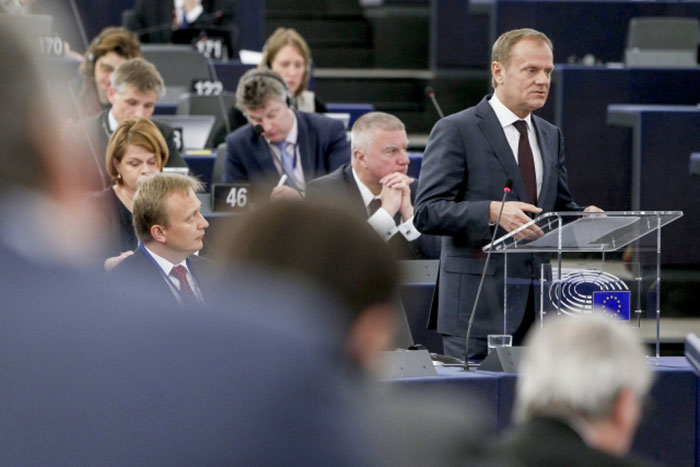Final remarks by President Donald Tusk to the European Parliament plenary session:
There are several aspects of our debate I would like to refer to. The first one is relocation. Relocation is and will be one of the key elements of the European solution to the crisis. In this aspect we need solidarity, I have no doubt. But we would make a mistake if it became the main tool of our policy, because it would be a simple incentive for further, even greater migration flows. This would be something like an encouragement for possible new migrants and this is why we have to be very cautious, especially when it comes to the communication with the outside world.
In the debate, Presidents Kamall and Verhofstadt refer to statistics on irregular migration in the context of the old new route, i.e. the Mediterranean route. I am always very cautious when it comes to statistics, but today I am considering them. First, as for the Balkan route, it is true that 150 000 irregular migrants have arrived to Europe since the beginning of this year. But the numbers are falling month after month.
From close to 70 000 in January to 50 000 in February to 30 000 in March and about 1000 so far in April. Just imagine if only in the month of January, in the middle of winter there were 70 000 migrants, how many would have come in April if we had not taken action?
Second, it is also true that since the start of this year, 20 000 irregular migrants have come to Europe via the Central Mediterranean route; and the numbers are growing. But no Syrians are among them. They are nationals of African countries such as Nigeria, Somalia, Gambia, the Republic of Guinea and Ivory Coast. What would have happened if we had not closed the Western Balkan route? We already now have three to five times more African migrants coming through the Central Mediterranean than this time last year.
Many have said today our priority should be to set up the European border and coast guard. I am for it, even if this body will not be operational in time for this year, as this is not possible. But we must ask ourselves the question: what is it the European border and coast guard should do? Let everyone through who wants to enter Europe, or stop and control them? I think it is obvious and not only for me: they should stop and control, which means in fact the same very controversial action that we apply right now. In the first place, we must expect that national coast guards enforce our law on the European border. The European border and coast guard should support whose who need help, but it cannot replace them.




